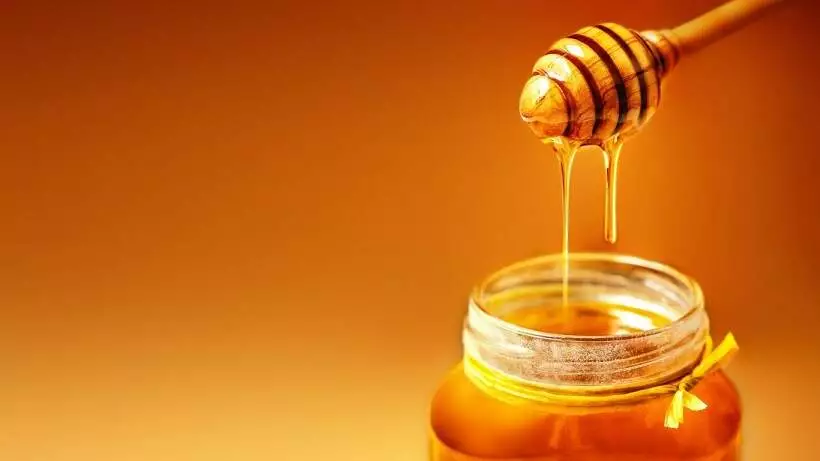Where is honey in the grocery store? Natural honey is pasteurized and filtered to remove bee carcasses, wax, pollen, and solid material. Pasteurization is a process utilized in honey, milk, cheese, yogurt, eggs, butter, cream, and wine to eradicate pathogenic microorganisms.
The process was invented by Louis Pasteur, a French scientist, in the 1800s. Pasteurized honey is available in most supermarkets, health food shops, pharmacies, mom-and-pop stores, and convenience stores. Honey many purposes make it in high demand year-round.
Consumers generally do not face much difficulty in finding honey in their local grocery stores. As long as you know which aisle it is stored in, you will be in and out in less than 15 minutes.
Where is Honey in the Grocery Store?

Most supermarket chains are divided into departments, including Grocery, Clothing, Toys, Electronics, Baby, Patio, Garden, Home Furnishings, Household Essentials, Beauty, Appliances, Auto, Pantry, Stationary, and Arts & Crafts.
To ensure convenience for customers, the departments are broken down into aisles. When consumers shop for specific products in land-based grocery stores, they generally focus on the aisles. Honey products are stored in the Condiment Aisle or on the opposite side of the Bread Aisle.
Condiment Aisle
The Condiment Aisle has a variety of products, such as ketchup, steak sauce, mustard, mayonnaise, salad dressing, jelly, jam, syrup, barbecue sauce, hot sauce, chicken wing sauce, hot chili sauce, soy sauce, tartar sauce, and taco sauce.
Opposite Of The Bread Aisle
It is also possible to find honey products next to the Bread Aisle. Loaves of sliced bread, hotdog buns, muffins, bagels, sub bread, hamburger buns, tortilla shells, donuts, croissants, cinnamon rolls, snake cakes, and crème horns are located in the Bread Aisle.
Opposite of the Bread Aisle, there should be a decent selection of jams, jellies, and honey. This is also where some grocery stores keep their coffees, creamers, teas, peanut butter, and hot chocolates.
Related: Where Is Velveeta In The Grocery Store?
Does Walmart Sell Raw Honey?

Yes, Walmart does sell raw honey. The selection includes organic, 100% natural, raw & unfiltered, 100% pure, raw honey & comb, unfiltered, 100% honeycomb, 100% wildflower, non-GMO kosher unfiltered, vanilla bean infused raw, and premium-grade honey.
Raw honey has not been pasteurized, purified, or filtrated. Some people like raw honey because it is believed to consist of more antioxidants, antibacterial properties, and antifungal properties than filtered and pasteurized honey.
What Honey Brands Are Sold In US Supermarkets?
What brands sell their honey in American grocery stores? Each grocery store chain carries a variety of brands. Some even carry their own generic brands like Walmart’s Great Value. The most common honey found in American-based mom-and-pops, grocery stores, pharmacies, supermarkets, and convenience stores include the following:
- Nature Nate’s
- Maison Peltier
- Detroit Hives
- Tremblay Apiaries
- Pescia
- Old Blue
- Pure ‘N Simple
- Great Lakes
- Fischer’s
- Gefen
- Local Hive
- Kelley’s
- Busy Bee
- Golding Farms
- Golden Blossom
- Jamie’s Hive
- Don Victor
- Cox’s
Most brands offer a selection of unfiltered, raw, pure, kosher, filtered, raw & comb, natural, and organic.
Is Raw Honey 100% Safe?
No, there is no guarantee raw honey is 100 percent safe for human ingestion. As previously mentioned, the pasteurization and filtration processes are designed to remove impurities like Clostridium botulinum bacteria. Scientific evidence links Clostridium botulinum bacteria to a rare form of food poisoning.
Clostridium botulinum spores pose health risks for infants and some children. The spores of the bacteria have been associated with a serious, rare condition known as botulism.
While only rare cases have been reported in the United States, botulism can be fatal in babies and young children under the age of 12 months.
Botulism attacks the infant’s nerves, resulting in paralysis. In serious cases, paralysis can lead to shortness of breath and death.
Recommended: Where is Buttermilk in the Grocery Store?
Should Parents Feed Their Children Pasteurized Or Raw Honey?
It depends on the child’s age. The medical community warns against feeding children under the age of 1-year -honey. This includes both unfiltered and filtered honey.
The digestive system in children under 12 months old is not able to fight off the formation of toxins linked to Clostridium botulinum.
Parents should take precautions when feeding children over 12 months old. This especially applies to children 1-year-old and older, with developmental delays. These children are known to have a problematic gut that can negatively impact the digestive system.
What Are The Health Benefits Of Pollen Found In Honey?
Pollen from honeybees is believed to offer an array of health benefits. Pollen is rich in antioxidants, which fight off free radicals associated with cancer and other chronic diseases. Bee pollen is also believed to decrease the risk of heart disease.
Antioxidants from bee pollen may decrease the risk of high LDL “bad” cholesterol levels. Uncontrolled high LDL cholesterol levels can result in stroke and heart disease in all age groups.
Bee pollen contains protein, which is believed to offer a host of health benefits. Protein found in bee pollen can help slow down the loss of muscle mass in malnourished adults and children.
Bee pollen protein is recommended in some people who have been diagnosed with muscular dystrophy, spinal muscular atrophy, and multiple sclerosis. However, you should speak with your primary care physician before including honey in your diet.
Bee pollen protein may also help humans maintain optimal weight by curbing hunger. In other words, a spoonful of honey may help make your stomach feel fuller for longer between meals.
Can Bee Pollen In Honey Soothe Inflamed Skin Due To Eczema?
Yes, bee pollen contains inflammatory properties that can be utilized to soothe irritated skin linked to eczema, diaper rash, and seborrheic dermatitis.
Bee pollen powder can be added to baby lotion to ease inflamed diaper rash. It can also be added to other types of lotion, even diaper creams.
Is Honey Safe For People Who Have Undergone Organ Transplant Surgery?
No, people who have undergone an organ transplant should not include honey in their diet without seeking approval from a licensed primary care physician.
Patients who are being treated with transplant medicines are at a higher risk of developing foodborne illnesses.
Unpasteurized and unfiltered honey may contain foodborne illness pathogens. Most physicians recommend a low- or anti-microbial diet following an organ transplant.
Filtered or unfiltered honey should be excluded from the organ transplant patient’s diet.
What Factors To Consider When Shopping For Honey?

Like most products, shopping for honey can be a bit overwhelming. This is especially true when there are plenty of availabilities.
To narrow your search, you need to know the most important factors to ensure you make the right decision the first go-round. These factors are described more in-depth below.
Local Or Store-Bought
Honey is divided into two primary categories – local and store-bought. Local honey is generally raw or unfiltered while store-bought is available in a variety of forms.
Store-bought forms include raw, pure, premium, unfiltered, organic, natural, filtered, GMO-free, and kosher. Most local producers do not pasteurize or filter their honey. They will sometimes throw in the comb as a little extra.
It is important to note, it may not be ideal for everyone to ingest the honeycomb, even though it is edible. Since it is impossible to filter the comb, it will contain C. botulinum spores.
Local honey is most likely not pasteurized, heated, or altered with corn syrup and sugar. Some honey enthusiasts believe local honey is of a purer form than store-bought alternatives. More evidence is needed to validate these claims.
Organic Or Regular
Honey is also available in regular and organic formulas. Depending on your preferences, you may find organic honey more suitable.
Organic honey is generated by bees that feed on plants grown without chemical miticides. Regular honey is generated by bees that feed on plants grown with chemical miticides.
Summary
Honey can be located in most grocery stores opposite the Bread Aisle. It can also be found in the aisle with other condiments. A great benefit of honey is it does not have an expiration date.
However, most store-bought brands are required to have an expiration date. Consider the aforementioned factors when shopping for honey.
Recent Entry: Where Is Pesto In Grocery Store?


